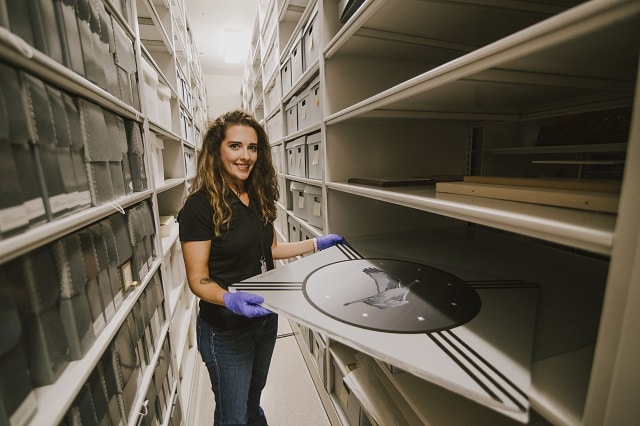Bozho,
I was blessed to be brought onto the staff at the CHC about one year ago and so far it has been a fantastic experience and I am greatly enjoying my position. I received my Bachelor of Arts in History and minor in communications from the University of Texas at El Paso. Later, I was awarded my Master of Arts in Museum Studies from the University of Kansas.
What exactly does an ethnology collections manager do?
First off, ethnology is a division of anthropology that studies cultures. At the CHC, the ethnology collection is comprised of an assortment of three-dimensional objects that are significant to, not only Citizen Potawatomi Nation, but also the greater Neshnabek. In our collection, there are dolls, tools, a large variety of lithics (i.e. projectile points, stone tools, etc.), art, basketry, ceremonial items, regalia, military ephemera and many other interesting objects.
The ethnology collection, as well as the archive (two-dimensional objects), serve as a repository to aid with strengthening and maintaining the past for the present and future. Both collections are open to researchers of all backgrounds.

The curatorial staff utilizes best practices for such things as documenting, housing, displaying and handling objects (the gloves are not just for show). With that being said, the first step to collections management is to understand how the collection was amassed and how items are handled when they first become a part of it.
Our collection consists of objects that have been donated or gifted to either the CHC or the Nation, collected by curatorial staff through purchases, and loaned to us by various institutions or individuals. The most common method of receiving objects is through donation or gift. A donation or gift means that the item’s ownership is being transferred to the CHC. There are many items that have been donated to us throughout the years for many reasons such as, the donor could no longer care for the object, or it has historical and cultural value, or the donor felt it should be utilized to educate others.
When an item is donated or gifted, the donor will complete a deed of gift which entails the donor’s information – name, address, phone number, email and vital information about the object deemed necessary by the curatorial staff. This vital information includes the name of the object, its type, description, provenance, condition and restrictions. What we refer to as the “provenance” of the object simply means its origin story, including details of who owned it, how it was used or who made it.
Objects are given a condition status based on many factors. An object that appears to be in excellent condition by the public, may be listed as only in good condition by the curatorial staff for numerous reasons like cracking or missing pieces.
When an item is loaned, the owner will complete the loan agreement, which is similar to the deed of gift except that the owner and the curatorial staff agree how long the object will be loaned to CHC and how it shall be retained or returned. We currently have objects on loan to us from institutions and individuals. Also, the curatorial staff may approach an institution or individual regarding a collection or an item thought to be ideal for exhibition at the CHC.
Finally, objects may be purchased by the curatorial staff for a number of reasons. We recently acquired a number of black ash baskets from the Brown Family of the Pokagon Band of Potawatomi. These were collected to expand our assembly of baskets and to help preserve this culturally important skill. An objective of the curatorial staff is to regularly seek out tribal artisans to create items that can help expand our collection and preserve important trades.
When an item is purchased, the seller fills out a purchase agreement, similar to both the deed of gift and loan agreement that documents key purchase information. These are the most important documents regarding the collection, not only legal reasons, but for the conservation of the object. Furthermore, staff may turn away an object for many reasons such as, it is a hazard to other objects or people, the donor can’t prove legal ownership of the object or the item could not be properly taken care of. It is an unfortunate thing to turn away an object or a collection, but keep in mind that the staff has a long list of criteria that they must contend with before taking an object on, like storage space, condition and financial resources.
If you would like to learn more, please reach out to me at the CPN Cultural Heritage Center at 405-878-5830 or visit our website at www.PotawatomiHeritage.com.
